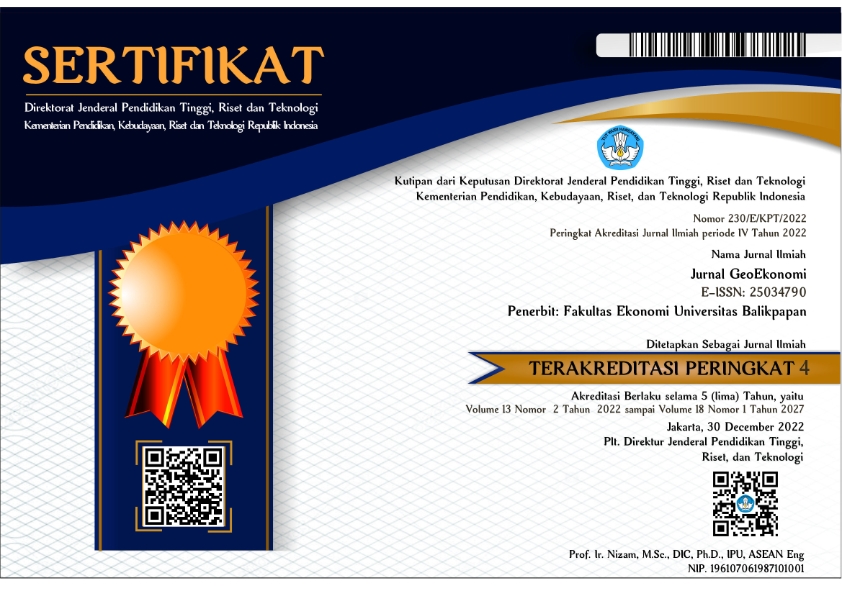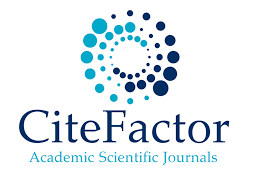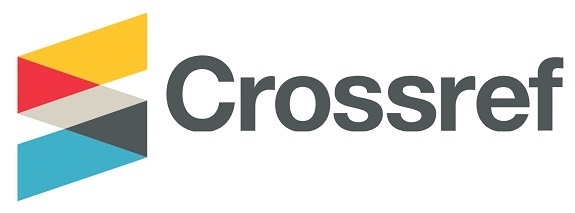PERAN PENDIDIKAN DAN PELATIHAN DALAM MENINGKATKAN KESEJAHTERAAN MASYARAKAT LOKAL MELALUI BUDIDAYA MADU KELULUT YANG BERKELANJUTAN
DOI:
https://doi.org/10.36277/geoekonomi.v15i1.2024.453Keywords:
Education, training, community welfare, stingless bee honey cultivation, institutional supportAbstract
Pendidikan dan pelatihan memiliki peran krusial dalam meningkatkan kesejahteraan masyarakat lokal melalui budidaya madu kelulut sebagai wujud ekonomi berkelanjutan. Tujuan penelitian ini untuk menganalisis dampak program pendidikan dan pelatihan terhadap efektivitas budidaya madu kelulut, dengan fokus pada kelompok petani madu di Kecamatan Samarinda Utara. Metode yang digunakan adalah deskriptif kualitatif, di mana responden, sebanyak 50 petani madu kelulut, diminta mengisi kuesioner terkait peran pendidikan dan pelatihan dalam peningkatan kesejahteraan. Variable yang digunakan adalah pendidikan dan pelatihan (X1), kualitas dan relevansi materi pelatihan (X2), kesejahteraan masyarakat lokal (Y) dan Variable moderating dukungan institusi terkait (M). Hasil penelitian menunjukkan bahwa dukungan institusi memperkuat hubungan antara pendidikan, pelatihan, dan kesejahteraan masyarakat, dengan indikator dukungan pemerintah setempat, kebijakan yang mendukung, serta monitoring pemerintah terhadap praktik berkelanjutan. Dengan demikian, pendidikan dan pelatihan yang efektif serta dukungan institusi dapat meningkatkan efektivitas budidaya madu kelulut yang berkelanjutan dan mendorong kesejahteraan masyarakat.
Downloads
References
Bartelmus, P. (2010). Use and usefulness of sustainability economics. Ecological Economics, 69(11), 2053–2055. https://doi.org/10.1016/J.ECOLECON.2010.06.019
Gemeda, T. K. (2014). Integrating Improved Beekeeping as Economic Incentive to Community Watershed Management: The Case of Sasiga and Sagure Districts in Oromiya Region, Ethiopia. Agriculture, Forestry and Fisheries, 3(1), 52. https://doi.org/10.11648/J.AFF.20140301.19
Isah, I. A., Olagunju, O., Ismail, M. M., Hassan, S., & Man, N. (2019). Enhancing Sustainable Stingless Beekeeping Production through Technology Transfer and Human Resource Development in Relationship with Extension Agents Work Performance among Malaysian Beekeepers. Asian Journal of Agricultural Extension, Economics & Sociology, 1–12. https://doi.org/10.9734/ajaees/2019/v30i230108
jurnal uniba. (n.d.).
Noorahya, F., Withaningsih, S., & Parikesit. (2022). Social acceptance of stingless bee honey cultivation for sustainable bioproduction system. IOP Conference Series: Earth and Environmental Science, 1211(1). https://doi.org/10.1088/1755-1315/1211/1/012005
Singh, H. P., Singh, A., Alam, F., & Agrawal, V. (2022). Impact of Sustainable Development Goals on Economic Growth in Saudi Arabia: Role of Education and Training. Sustainability (Switzerland), 14(21). https://doi.org/10.3390/su142114119
Downloads
Published
How to Cite
Issue
Section
License
Copyright (c) 2024 Jurnal GeoEkonomi

This work is licensed under a Creative Commons Attribution 4.0 International License.
You are free to:
Share - copy and redistribute the materials in any medium or format for any purpose, even for commercial purposes.
Adapt - compose, change and develop the material for any purpose, even for commercial purposes.
The licensor cannot revoke these freedoms as long as you follow the license terms.
With the following conditions:
Attribution - you must give appropriate credit, provide a link to the license, and indicate if changes have been made. You may do so in a reasonable manner, but not in any way that suggests that the licensor endorses you or your use.
No additional restrictions - You may not implement legal provisions or technological measures that legally restrict others from doing anything permitted by the license.
Notice:
You do not have to comply with the license for elements of the material that are in the public domain or where your use is permitted by an applicable exclusion or restriction.
No warranties are given. This license may not grant all the permissions necessary for your intended use. For example, other rights such as publicity, privacy, or moral rights may limit how you use the material.







_geoekonomi.png)
_geoekonomi.png)
















